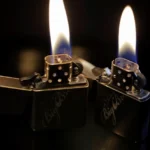Why does a Gas Lighter Cause Shock
Gas lighters have become an essential part of our lives, especially to ignite a gas stove or light a cigarette. It is a device used for gas stoves that are not equipped with automatic ignition systems. The device is designed with a piezoelectric effect which helps generate a spark to ignite the burner. The voltage generated from a piezoelectric effect is in the range of 800 volts. A gas lighter is intricately wired in a manner that the entire voltage is concentrated in a small region of air gap in between the two metallic points. Due to the generation of this high voltage, the air is ionized and forms a path for discharge. This discharge is basically the spark that ignites the burner to form a flame when we expose it to the gas stove.

The gas lighter works on a friction-heat principle which entails that if we generate friction on a specific substance, a spark will be created. One of the common problems faced by the users is why does a gas lighter cause shock? Let’s dig into the mechanism to find out the reason.
Reason for getting shocked by a lighter
- Piezoelectricity principle
The main reason for the shock is the transfer of charge due to the difference in voltage between your body and the top of the lighter. The lighter consists of a Quartz crystal inside of it, and with the help of the piezoelectric principle, it is able to create a massively instantaneous voltage. The voltage is carried through the lighter to the tip that the user views at the center. Here is the spark generated between the tip and the body of the gas lighter. We get a shock when you touch the tip to the gas stove and are actually touching the lighter and the stove all at the same time. At the same time, the exact route of the parallel current through our body may differ according to what and how we are touching.
- Faulty lighter
Another reason why does a gas lighter cause shock could also be leakage due to using a faulty lighter. Make sure to thoroughly examine a gas lighter to check for flaws before purchasing it to prevent any such dilemmas.
- Shock waves
Sometimes something that you feel like a shock is a sensation that seems pretty much like a shock. It happens when you ignite the fuel; you create a small explosion together with a shock wave that enforces the dry air all across your skin. It creates an exchange of electrons, giving you the sensation of making you feel like you’ve been electrocuted.
- Touching the arcs
Another possibility of why does a gas lighter cause shock is that you’re unintentionally touching the electric arcs. This might make you feel a sensation of a sharp bite like you get from static electricity. The only difference is that this is probably ten times stronger than that. It will probably wake you up through and through. So, make sure that you’re not touching the electric arcs.
Is this shock dangerous?
A handheld lighter is highly unlikely to be capable of causing you any harm other than a tiny shock unless the voltage is very high. You should assess the area that was directly in contact with the shock for any damages. However, the voltage of such a small intensity will only cause a few red marks on your skin, which will get okay within no time.
So, the shock caused by a gas lighter isn’t dangerous for your body at all. However, make sure to take care of the reasons mentioned above while using a gas lighter to avoid any of such circumstances.



